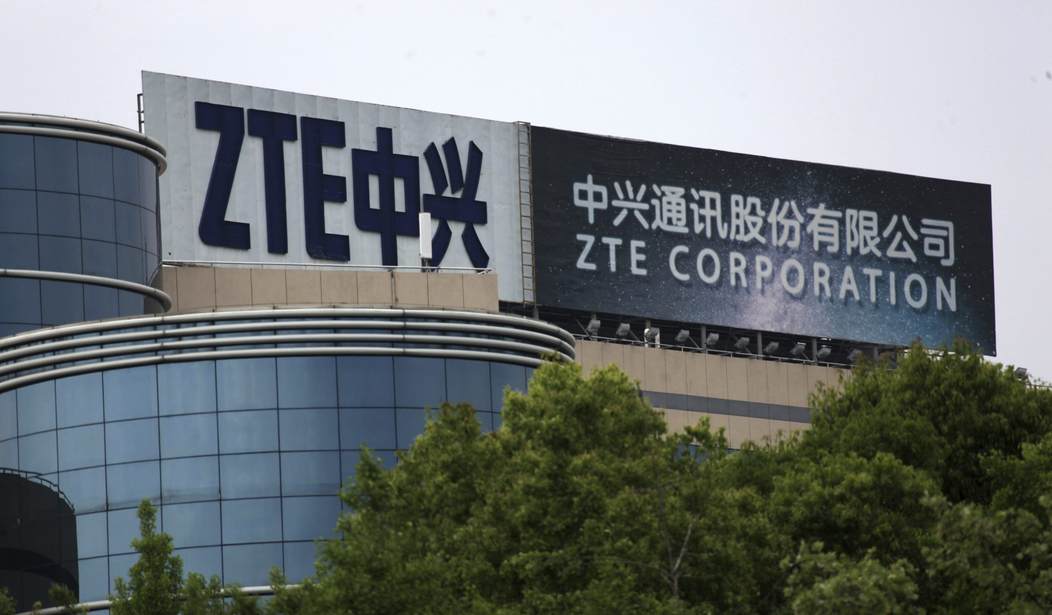WASHINGTON — President Trump vowed Sunday to help Chinese telecom giant ZTE, which has been the subject of equipment bans for suspected espionage as well as a violator of Iran and North Korea sanctions, get back on its feet.
Top officials from the CIA, NSA, FBI and the Defense Intelligence Agency testified at a Senate Intelligence Committee hearing in February that smartphones made by Chinese tech companies Huawei or ZTE posed a security risk.
“I think probably the simplest way to put it in this setting would be that we’re deeply concerned about the risks of allowing any company or entity that is beholden to foreign governments that don’t share our values to gain positions of power inside our telecommunications networks,” FBI Director Christopher Wray said then. “That provides the capacity to exert pressure or control over our telecommunications infrastructure. It provides the capacity to maliciously modify or steal information. And it provides the capacity to conduct undetected espionage. So, at a 100,000-foot level, at least in this setting, those are the kinds of things that worry us.”
Then-NSA Director Adm. Mike Rogers predicted “this is a challenge, I think, that’s only going to increase, not lessen, over time for us.”
“I would say you need to look long and hard at companies like this,” Rogers added.
CIA director nominee Gina Haspel similarly said at her recent confirmation hearing that she wouldn’t use the Chinese telecommunications devices.
The Pentagon recently banned U.S. bases from selling Huawei and ZTE devices in retail stores, as they “may pose an unacceptable risk to the department’s personnel, information and mission.”
Last month, Commerce Secretary Wilbur Ross announced that his department’s Bureau of Industry and Security imposed a denial of export privileges against ZTE. The company agreed to a combined civil and criminal penalty and forfeiture of $1.19 billion in March 2017 after illegally shipping telecommunications equipment to Iran and North Korea, making false statements, and obstructing justice. This year, the Commerce Department discovered that ZTE made false statements to BIS during the settlement period and during the 2017 probationary period.
“ZTE misled the Department of Commerce. Instead of reprimanding ZTE staff and senior management, ZTE rewarded them,” Ross said in an April statement. “This egregious behavior cannot be ignored.”
Also in 2016, ZTE was found to have been one of the manufacturers behind carefully concealed backdoor spyware placed on more than 700 million Android phones.
But on Sunday, Trump tweeted, “President Xi of China, and I, are working together to give massive Chinese phone company, ZTE, a way to get back into business, fast. Too many jobs in China lost. Commerce Department has been instructed to get it done!”
A few hours later, Trump tweeted, “China and the United States are working well together on trade, but past negotiations have been so one sided in favor of China, for so many years, that it is hard for them to make a deal that benefits both countries. But be cool, it will all work out!”
Last week, Sen. Marco Rubio (R-Fla.) introduced the Fair Trade with China Enforcement Act, which includes a provision to ban the federal government or subsidiaries and contractors from purchasing telecommunications equipment or services from Huawei and ZTE.
“How America responds to the growing threats posed by China is the single most important geopolitical issue of our time, and will define the 21st century,” Rubio said.
After the FCC voted unanimously last month to advance a measure to limit the ability of ZTE and Huawei to sell in the United States, Senate Minority Leader Chuck Schumer (D-N.Y.) said on the Senate floor that the companies’ effort to enter the American market “is a great example of how China attempts to steal our private data and intellectual property.”
“The FCC has said that allowing these two companies into the US would pose a national security threat because it would give state-backed Chinese companies ‘hidden backdoors to our networks’ that would allow them ‘to inject viruses and other malware, steal Americans’ private data, spy on U.S. businesses, and more,'” Schumer said. “Those are the words of the FCC. The United States is a world leader in high-tech manufacturing and development, so naturally, China’s government is coming after that lucrative industry and continues to try to steal their way to a competitive advantage. Every one of our top industries that employ millions of Americans in good-paying jobs, that make our economy the envy of the world, are targeted by the Chinese — and this one is no different.”









Join the conversation as a VIP Member